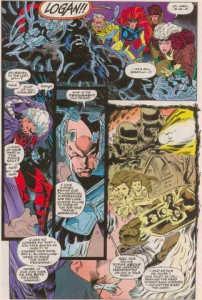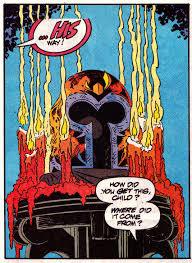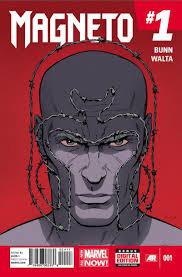So this passed month saw the beginning of a solo title for the Master of Magnetism and one-time “Saviour of Mutantkind” known as Erik Lensherr.
Without doubt one of the greatest creations of the Marvel Universe, Magneto has nevertheless been a character in decline for a very long time, with very little happening in contemporary comics to enhance his legacy or standing.
Yes, even the best characters have dry spells, but for a character of Magneto’s stature and gravitas to have lost so much of his fascination over the years seems both extraordinary and somewhat disappointing.
Magneto #1, by writer Cullen Bunn, doesn’t in itself restore Erik Lensherr to former glory (how could it?), but it paints an interesting new picture and the series may potentially go on to do intriguing things with the Master of Magnetism in the months to come.
A Jewish Holocaust survivor, famously compared by Stan Lee to Malcolm X (in relation to Charles Xavier’s ‘Martin Luther-King‘, the analogy goes), while cited by Bryan Singer as a gay rights extremist; Erik Lensherr was, in the hands of his best writers, about as complicated and as relevant as a character could get.
Everything he is about was forged in his grim experiences surviving Nazi Germany; Auschwitz cast its grim shadow over his entire life and his various actions, shaping his outlook on the “mutant problem”.
Single-mindedly resolved to prevent such atrocities as the Nazi Holocaust from ever being committed against Mutantkind by humans, Magneto, for me as a young person at the time, was the first character that made me realise comics weren’t just about colorful-costumed super-people, witty one-liners and childish showdowns, but could be about something much more adult; something rooted in real-word historical events or social issues, something morally ambiguous and endlessly complicated.
And, even aged thirteen or fourteen, I was already much more interested in someone like Erik Lensherr than in a wise-cracking Spiderman, a silly cartoonish Fantastic Four or a morally superior Superman. That’s just as easily a comment about the moral complexity and social relevance of the larger X-Men world in relation to other titles, but it’s also specifically a comment about Magneto and his power as a character and as a symbol.
What was always so engaging about Magneto, at least in my primary reading era, was the complexity; the shades of grey. He wasn’t a one-dimensional supervillain or textbook bad guy. He was a tortured figure with moral dimensions, a motivation that had always made perfect sense, a sympathetic cause, and a past mired in pain and suffering.
That Holocaust origin to the Magneto story had always ensured the character would never read as just a big, bad comic-book villain, though it was Chris Claremont‘s considered humanisation of Magneto that really raised the character to a new level, particularly from the brilliant God Loves, Man Kills onward, this being one of the earliest stories to portray Magneto as less of a villain and more of a mutant activist in keeping with that aforementioned Malcolm-X analogy.

Though the first real sign of the evolution in Magneto’s portrayal was in 1981’s Claremont-written Uncanny X-Men #150 ‘I, Magneto’, in which having almost killed the young Kitty Pryde, Erik begins examining his own actions and own nature, thus paving the way for his character’s greater development.
Tied to this was always the nature of his relationship with Charles Xavier; an ongoing clash of ideologies between two people who deeply understand each other and who entirely perceive the same problem in society but entirely disagree on the nature of the solution. From 1982’s Uncanny X-Men #161 in which the origin of Xavier and Magneto’s friendship in Israel is first shown right through to the decisive brutality of Charles’s psychic assault on Erik in X-Men #25 in 1994, their friendship, their enmity, and their past had always been – for me anyway – the central dynamic of the X-Men world and one of the most fascinating relationships in comics.
This was obviously recognised by Bryan Singer and the others involved in taking X-Men to the big-screen too, which is why the first two X-Men films are so centred on the Charles/Erik relationship, as is the more recent First Class; indeed the first X-Men film opens with Magneto as a child in a ghetto in Nazi Poland and not with Wolverine, Professor X or any of the other X-Men, and the first meaningful dialogue in the movie is between Charles and Erik.
To just digress into movie-talk for a moment, the reason X-Men 1 and 2, and First Class, work is because Magneto is portrayed as a sympathetic, complex character, and the reason X-Men 3: The Last Stand doesn‘t work is largely because Magneto is portrayed as a more cut-and-paste ‘bad guy’.
Throughout their comic-book history, even when Charles and Erik were mortal enemies scheming against each other, there was still always the underlying love and regret evident in both men, even if it was often just beneath the surface. This was most evident in Chris Claremont’s classic X-Men #1 – 3 (or ‘Mutant Genesis’: in fact the first X-Men books I ever read) from 1991 and right up until X-Men #25 when Xavier resorted to extreme measures and an undermining of his own great moral code in order to devastate his old friend and put an end to the Magneto problem “once and for all” via ethically questionable means.

I must’ve read X-Men #25 about as many times as I rewatched The Empire Strikes Back; such was the impact it had on me.
Speaking as a writer, comics – and some of those X-Men issues more than anything else – have been an immeasurable influence on me, just as much or more so than any classic literature.
The Magneto I fell in love with peaked twenty to thirty years ago, the Erik Lensherr I most keenly remember, the one I unquestioningly think of as the definitive version of the character, is the Magneto that appeared from roughly 1986 to 1994 or thereabouts; the Magneto that Xavier made the headmaster of his school. The Magneto who, from New Mutants #35 through to #75 was passionately overprotective of his young students, the Magneto who was no longer arch-nemesis but caring figurehead and father figure.
He was essentially the same Magneto that appeared in Chris Claremont’s greatly-revered X-Men #1 – 3 (1991) – or X-Men: Mutant Genesis, as it’s otherwise called – and right through to the superb Fatal Attractions storyline in 1994. That Magneto, while still capable of extreme, villainous acts, was essentially a sympathetic figure; this being most evident in X-Men #1 when his home is attacked from Earth and what he does in response is mere retaliation (along with the fact that he is largely manipulated by Fabian Cortez).
Yet even as he is provoked into taking action, we still clearly see his affection and respect for Xavier and some of the X-Men, particularly Rogue; this was a man forced into harsh actions almost against his own desires. And again when he seeks retribution against Charles’s beloved Moira MacTaggart in X-Men #3 it is for justifiable reasons. His betrayal at the hands of his own chief follower, Cortez, and his ‘death’ always read more as a hero’s end than anything else.
His return in the Fatal Attractions storyline in 1994, written cardinally by Fabian Niceiza and Scott Lobdell, remains one of my absolute favorite memories of my primary comics-reading age; his dramatic arrival during the funeral of his former student Magik/Illyana Rasputin in Uncanny X-Men #304 and his final defeat and devastation at the hands of Xavier and co in X-Men #25 being the events that not only cemented my love for Magneto, but also cemented my long-time interest in and affinity for comic-books as a medium.
Throughout this brief era, Magneto was – all at once – villain, sympathetic anti-hero, victim, and even more or less a god; he is worshipped by his mutant followers the Acolytes as the “saviour of mutantkind”, which in itself was a fascinating state of affairs.
Yet even through all the apocalyptic bombast and confrontation, there were the quieter moments and connections that reminded us of why Magneto was never just a simple bad guy to be taken down.

One of my favorite moments of that entire classic crossover occurred in X-Force #25 when we see the degree of respect and affection that Cannonball, Sunspot and the other former New Mutants (his former students) has for him. And Magneto shares that affection; he wants them on his side, but he lets them go without harm (Cable isn’t so lucky – he gets royally ripped to shit by Magneto in that same issue, but I’ve never liked Cable, so seeing Magneto deal with him was actually a guilty pleasure).
This was Magneto at his height as a character; the Erik Lensherr I’ve always had an affinity for. This is the Magneto that was pretty much lost after this and has probably never quite been recovered, despite some occasional flashes of greatness such as Dark Seduction or Grek Pak’s more recent Magneto: Testament.
Beyond that golden era, I’ve somewhat lost track of who Magneto is supposed to be exactly and where he fits into the contemporary X-Men tapestry, particularly in this post-Charles Xavier landscape.
Admittedly I’ve only recently come back to any kind of attentive comic-book reading in the last few months; though I’ve been otherwise keeping track of news and storylines for years, albeit from a distance, and I’ve found myself rather ambivalent about the modern X-Men world.
So although I haven’t come across all that much buzz over the new Magneto title, one would hope this solo run will give the character a much-needed revitalization.
___________________
Magneto #1, by writer Cullen Bunn, features a significantly-weakened Magneto now having engaged in a one-man quest to seek out and ‘punish’ people guilty of crimes against mutantkind.

The new Magneto title is an interesting direction in characterization terms. I – cautiously – like it, based on reading #1. It’s a new and somewhat singular tone being adopted and I think it should be a very interesting body of work to add to Magneto’s already rich tapestry.
I have to say I very much like the idea of Magneto waging a gritty, one-man campaign, almost in a Punisher style. I also like the idea of exploring a Magneto with very diminished powers, no longer the god-like figure of previous eras.
The opening pages of Magneto #1 possibly set the tone for the series – certainly for the issue anyway – when we see a bleak, brutal visual of one of his victims having the fillings ripped out of his teeth and having his skull punctured in the street. The poor fellow’s just been well and truly Magnetoed. Artist Gabriel Hernandez Walta and colorist Jordie Bellaire provide a stylized, visually bleak tone to the story, this comic immediately feeling very adult, the almost haunting feel to the art marrying the decidedly gritty feel to the theme and characterisation of this edgy book.
This new set-up made me think instantly of those old ‘Nazi Hunters’, usually Jewish, that were on the case in the years after World War II, tracking down Nazi war criminals all over the world, sometimes for decades, obsessed with bringing them to justice.
This connection was almost certainly an inspiration for the version of Magneto we saw portrayed by Michael Fassbender in X-Men: First Class; and the echoes of that Magneto to the Magneto we see in this new title are no coincidence either; according to several sources, Uncanny X-Men writer Brian Michael Bendis originally pitched the Magneto series as an evolution from the Erik Lensherr that was hunting down Holocaust criminals in First Class.
On one level, I’m wary of comic books taking their cues from the film adaptations, as this seems ridiculously like a dog chasing its tail; but in this instance it does make some sense and it seems like a rich avenue that might yield good fruit.
I have to admit, however, despite the book’s strengths, I’m a little uncomfortable with the look of Magneto at this stage. I’m not advocating a return to the classic, almost cartoon-like Magneto look of old – no, I understand that times change and things move on and evolve, that’s fine. But the Erik Lensherr we see here is just a little too bleak, a little too divorced – visually speaking – from his more familiar identity; so much so, in fact, that he feels like a documentary subject rather than a fictional character at times.
However, that may change as the series progresses; and there does seem to be a rich possibility in this new title to breathe new life into an old character.
Whether it’ll stand alongside past glories for Magneto is another matter. The best of those past glories are pretty impossible to match at this stage; but this is a different time and a different climate, and at any rate I’m glad there’s a Magneto title in this Marvel NOW tapestry and look forward to seeing how it develops…





How do you feel about the series now? I picked up the first 6 issues but stopped and kinda lost interest.
Yeah I kind of lost interest really quickly too. It’s a shame, as Magneto is classically an incredible character, but he’s just not been written well for a number of years. I’m not a fan of the art in this series, and the writing is only occasionally good. The issues leading in to ‘Axis’ were actually quite good though.
Yeah the art didnt do anything for me either. Hopefully axis can bbreathe new life into the character, cause I also think hes one of the best, most complicated villians marvel has ever made.
Thanks Mumra 🙂 Firstly, ‘colorful’ – the system auto-corrects my English spelling and sometimes I can’t be bothered to fight it. Secondly, comics were cheap-as-fuck in the early 90s, man. I was picking up comics for seventy pence at one point! Anyhow, thanks for reading, man. 😉
Read this and thought a few things:
Firstly – AWESOME read (your welcome)
Secondly, “colorful-costumed”. Shouldn’t it be *colourful, just so that UK English can be shoved down people’s throats whether they like it or not?
Thirdly. Man, how the fuck were you able to afford comics back in the ’90s? How’s that possible when I remember them being expensive as hell! Poverty is a bitch!! 🙁
Lastly, how are you keeping up with reading the latest comics? Have you caught on yet to the world of .cbz? If not, let me know so I can clue you up on the little I know.
Reblogged this on The Puppet Masters Faction On WordPress.